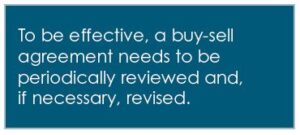Life comes at you fast. Marriages end, illnesses and injuries occur, people decide to change careers or retire — sometimes without much advance notice! Any of these events could pose a major problem to any construction company with multiple owners. That’s why having a buy-sell agreement is a good idea.
Keeping it fresh
A buy-sell agreement is a legal contract among business owners that sets forth guidelines for the transfer of ownership interests. The agreement gives the nondeparting owners or the company itself the right — or, in some cases, the responsibility — to buy a departing owner’s interest should a “triggering event” occur. Such an event could be any of the circumstances mentioned above, as well as others, such as the loss of a professional license or certification.

To be effective, a buy-sell agreement needs to be periodically reviewed and, if necessary, revised to reflect changing circumstances. Of particular importance is scrutinizing the valuation provision, which establishes the purchase price for a departing owner’s shares.
Depending on the mechanism used to value interests in the business, a valuation provision drafted years ago may understate or overstate the company’s value. This can lead to undesirable outcomes or disputes. And the risk is especially acute now, given the significant impact the COVID-19 pandemic has had on the financial performance — and, therefore, value — of many construction businesses.
Negotiating value
Valuation provisions in buy-sell agreements use various approaches depending on how the business owners decide to go about it. Sometimes, when an owner leaves the company, the parties negotiate the buyout price. This approach has some advantages: It’s cost-effective and allows the parties to consider recent events in determining a fair price for the shares of the business.
The risk, of course, is that the parties fail to negotiate in good faith, can’t reach an agreement and end up in court. One way to mitigate this risk is to provide for a negotiated price but bring in an independent appraiser if the parties are unable to agree within a certain time frame.
Getting an appraisal
To avoid long negotiations, many companies opt for an appraisal. Valuation by one or more independent professional appraisers at or near the time of the buyout is usually the most accurate approach, though it can be costly.

Some buy-sell agreements call for periodic appraisals and use the resulting price for any shares transferred between then and the next valuation date. Others require the parties to conduct an appraisal on the occurrence of a “triggering event,” such as an owner’s death or disability.
Be sure your agreement provides unambiguous valuation guidelines for appraisers. For instance, it should spell out the valuation date and standard (such as fair market value, fair value or investment value). It should also define the premise of value (for example, controlling interest or noncontrolling interest).
Some agreements provide that the valuation date is the date of the triggering event, but this type of provision is susceptible to manipulation by an owner who, for example, times his or her resignation to maximize the buyout price. A better approach is to set the valuation date as the last day of an accounting period (for instance, the end of the most recent fiscal year or quarter).
Applying a formula
Using a valuation formula tied to book value, earnings or other benchmarks has the advantage of simplicity and predictability. However, it’s also risky. Book value, for example, may reflect a company’s fair market value at formation, but it tends to significantly undervalue established companies with consistent track records of earnings.
Formulas based on earnings multiples may or may not be reliable indicators of value, depending on a company’s particular circumstances at the time of the valuation. One potential solution is to revisit the formula annually and adjust it to produce a price the parties view as fair.
Group effort
Creating or revising a buy-sell agreement should be a group effort involving, not just the owners themselves, but a team of professional advisors.
We welcome the opportunity to put our accounting expertise to work for you. To learn more about how our firm can help advance your success, don’t hesitate to contact Kathy Corcoran at (302) 254-8240.

